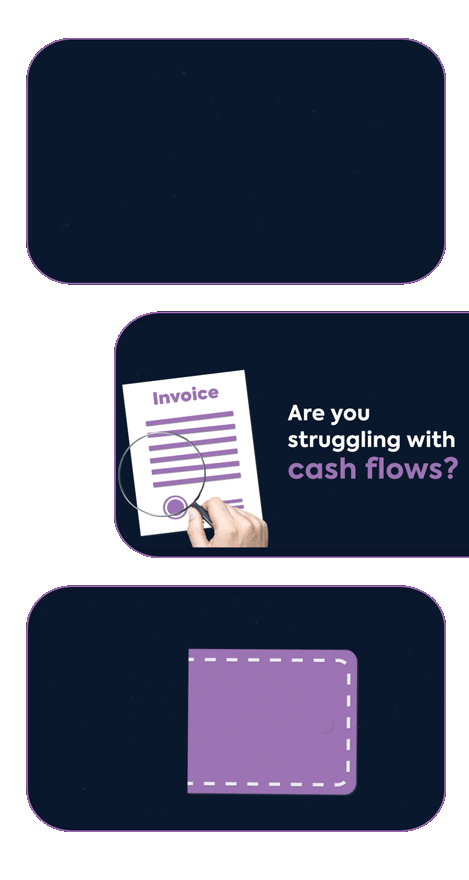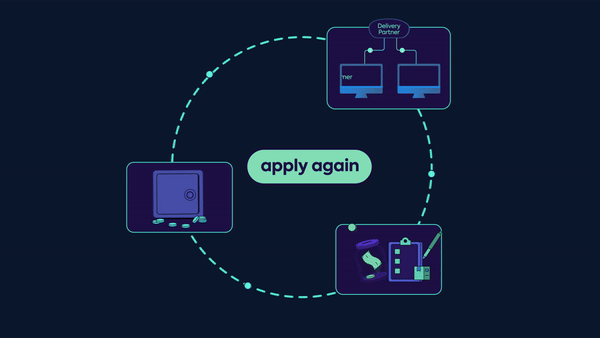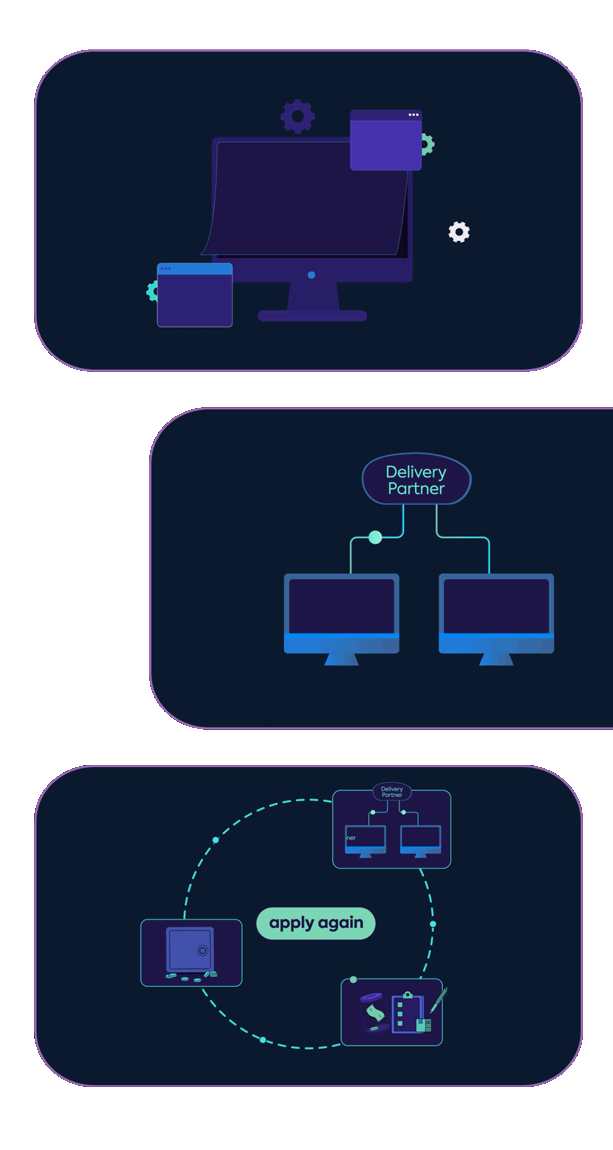
Unlock Cash Flow with Flexible Financing Solutions.
Access Working Capital and Invoice Financing to Grow Your Business.

Invoice Factoring
Turn your unpaid invoices into immediate cash flow, allowing you to manage your cash flow more effectively and grow your business.

Working Capital Financing



Platform-Based Lending
Running a restaurant or online store requires consistent cash flow to keep things running smoothly. But unexpected expenses or slow sales periods can disrupt your rhythm. That’s where Abhi’s Platform-Based Lending comes in.
Access Working Capital Based
on Your Foodpanda Earnings
Overcome cash flow challenges and keep your restaurant operating at peak performance.
Abhi’s Platform-Based Lending provides access to working capital based on
your sales on the Foodpanda platform. This means you can:
- Pay vendors on time
- Maintain adequate inventory
- Meet payroll obligations
- Navigate economic downturns with confidence
Grow Your Daraz Business
with Flexible Financing
Are you a registered Daraz seller with a proven track record? Abhi’s Platform-Based Lending can unlock the working capital you need to fuel your online success.
You can use the funds to:
- Replenish stock
- Invest in marketing
- Expand your product offerings
- Take advantage of buying opportunities
How it
works
Step 1
Initial Consultation
Submit your invoices, business documents, and financing requests directly through the ABHI Self-Onboarding Portal for a quick and hassle-free process.

Step 2
Assessment & Approval
ABHI's experienced teams will conduct a thorough evaluation of your financial stability based on the information provided. Upon approval, they will determine the maximum amount they can provide, typically up to 80% of the total invoice value.

Step 3
Transfer & Communication
Upon approval, ABHI will facilitate the transfer of funds to your corporate account and provide you with necessary transaction details. They will also communicate the agreed-upon payback date for your convenience.

A step-by-step process of the user’s journey
for your company getting onboard to get Invoice Factoring

How it
works
Step 1
Financial Evaluation
Submit your business documents and financing requests directly through the ABHI Self-Onboarding Portal for a quick and hassle-free process.

Step 2
Assessment & Approval
ABHI's experienced teams will conduct a thorough evaluation of your financial stability based on the information provided. Upon approval, they will determine the maximum amount they can provide, typically up to 80% of the total invoice value.

Step 3
Transfer & Communication
Upon approval, ABHI will facilitate the transfer of funds to your corporate account and provide you with necessary transaction details. They will also communicate the agreed-upon payback date for your convenience.

A step-by-step process of the user’s journey
for your company getting onboard to get Cash on Delivery Financing

How it
works
Step 1
Reach out to the Vendor
You reach out to the sales team on the respective platform and inform them about your interest in the financing from ABHI for your venture.

Step 2
Easy Eligibility Check
The sales team from the respective platform will give you all the details about Financing and assess your initial credit limit.

Step 3
Simple Documentation
You will be required to submit necessary KYC documents to finalize your credit limit.

Step 4
Streamlined Access
You upload invoices to our secure portal and access financing based on your credit limit.

Step 5
Repayment Made Easy
We recover the financing amount and service fee from your platform settlements.

A step-by-step process of the user’s journey
for your company getting onboard to run payroll on demand.





AbhiKaarobar
Features

Tailored Solutions
Our team of experts works closely with you to
understand your unique business needs and tailor
our financial solutions to meet your
specific requirements.
Tailored Solutions
Our team of experts works closely with you to
understand your unique business needs and tailor
our financial solutions to meet your
specific requirements.

Fast & Efficient
Our streamlined application process ensures
quick approval and disbursement of funds,
so you can access the capital you need
without delay.

Flexible Terms
We offer flexible repayment terms
and pricing, allowing you to choose
the financing option that best suits
your business's financial situation.
What Our Clients Say About Abhi

Use
Cases
When and where can this be used?

Case 1
Manufacturing Companies
Option 1:
Option 2 :
The manufacturing company can get invoice factoring services offered by ABHI. By factoring invoices, the company can access immediate cash flow based on outstanding invoices, without waiting for payment from customers. This enables the company to alleviate cash flow constraints and maintain operational efficiency.

Case 3
HORECAs Industry
Option 1:
Option 2 :
By factoring invoices with ABHI, the FMCG company can access immediate cash flow based on outstanding invoices, without waiting for payment from distributors and retailers. This provides the company with the financial flexibility to manage operational expenses and manage cash flow challenges effectively.

Case 2
Pharmaceutical Companies
Option 1:
Option 2 :
By factoring invoices through ABHI, the company can access immediate cash flow without waiting for the manufacturer’s clearance. This ensures smooth business operations and minimizing financial constraints, enabling the company to maintain market competitiveness and accelerate growth opportunities.
Use
Cases
When and where can this be used?

Case 1
E-commerce
Option 1:
Option 2 :
By opting for ABHI COD Financing, the company can access the necessary cash to address inflation-induced price hikes and fuel business expansion. With ABHI providing the required capital and BlueEx handling deliveries and collections, the company can ensure uninterrupted operations and capitalize on growth prospects.
Use
Cases
When and where can this be used?

Case 1
Restaurants
A restaurant that has successfully expanded with multiple branches across different cities or areas is now facing cash flow challenges. Despite having a strong customer base and steady revenue, the delay in receiving payments from previous orders is creating financial strain.
Option 1:
The restaurant continues to rely on traditional payment cycles. This means waiting for the payments from previous orders to maintain daily operations. However, this delay can cause disruptions, such as delayed supplier payments, compromised quality of service, and potential customer dissatisfaction.
Option 2 :
The restaurant leverages Foodpanda Platform-Based Lending through ABHI. This initiative provides immediate access to working capital, enabling the restaurant to receive payments for its orders promptly. By utilizing Foodpanda’s Platform-Based Lending, the restaurant can overcome cash flow challenges, pay suppliers on time, and ensure seamless operations across all branches. This not only helps in maintaining service standards but also supports further growth and expansion.
Use
Cases
When and where can this be used?

Case 1
Vendor / Merchant
A seller on daraz with limited capital has to buy new inventory and expand business operations. The seller waits for the payments of its goods sold to expand its business operations. With Daraz Merchant Financing through ABHI, the seller can get access to working capital, which they can utilise to replenish stock, invest in marketing, expand product offerings and accelerate business growth.
A seller on Daraz with limited capital has to buy new inventory and expand business operations. However, the seller faces challenges as he has to wait for the payments of goods sold to fund their expansion efforts.
Option 1:
Option 2 :
The seller can leverage Daraz Merchant Financing through ABHI. This initiative provides the seller with access to working capital, allowing them to overcome cash flow constraints. With Daraz Merchant Financing, the seller can replenish stock, invest in marketing campaigns, diversify product offerings, and accelerate business growth.
Why it's important to financially
empower employees
 conducted a study on Earned Wage Access
conducted a study on Earned Wage Access
Find out how it can elevate employee happiness & productivity
employees face unexpected expenses that can’t be paid through their monthly salary*
of employers believe that employees’ morale and well-being at work is affected when they can’t access funds in an emergency*
71% of the working individuals feel positive about the companies who offer EWA as an added benefit.
Here
to Help
Some Frequently Asked Questions
Invoice factoring is a financial service of paying a company’s unpaid invoices to keep their operations running smoothly and avoid delays in payment. For example, if you owe money to a vendor and don’t have the cash to pay immediately, ABHI will pay for you and you will later pay back ABHI. To summarize, invoice factoring is basically a short term loan against your receivables.
Any business that supplies goods/services to large companies can avail this service. Eligibility and amount of factoring is decided by the creditworthiness of the business and their past financial history. So the companies interested in this service have to be willing to share their financial information and other related documents.
There is no limit on finance against invoices as it actually depends on the value of the invoice raised. The limit to which ABHI will facilitate the invoice would be set against the financial information of the company. ABHI will provide up to 80% financing against the invoices submitted.
ABHI does short term financing against invoices, the tenure can range from 5 to a maximum of 60 days.
ABHI’s financing solutions help your company maintain steady cash flow, unlock funds tied up in invoices, and access working capital or platform-based lending when you need it most. This allows you to cover day-to-day expenses, invest in growth opportunities, and scale operations without waiting for payments or facing cash flow constraints.
Yes! ABHI holds a Non Banking Financial Company (NBFC) License by the Securities & Exchange Commission of Pakistan (SECP) that allows us to lend money to companies.
Eligibility depends on factors like your business type, financial health, and invoice history. Simply sign up on the ABHI Self-Onboarding Portal, share your business and financial details, and our Risk, Legal, and Compliance teams will review your information. Once approved, your credit limit will be assigned, and you can start accessing financing.
10-12 working days.
30, 60, 90 or 120 days.
Yes it is.



